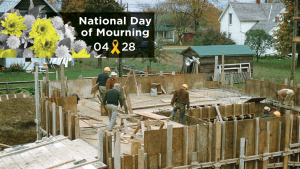Mentorship is part of the solution to an industry’s training needs to ensure the continuation of an industry from one generation to the next.
Labour market trends for both construction and mining predict a pattern of a labour shortage in the future, as more people leave the workforce than enter it.
The Canadian Mining Industry Employment and Hiring Forecasts predicts a wave of retirements as the current workforce ages, affecting productivity as workers change roles when current workers leave.
Passing on knowledge and skills from one generation to the next will be necessary so that the remaining workforce will have the ability to take on new roles.
On-the-job mentoring can supplement technical training classes because workers will be able to receive training while on the job.
To have a good mentoring system, a company needs strong mentors.
Some workers have the training or aptitude to be good mentors, but others who have work experience may need training before taking on this role.
SkillPlan recognizes the need for good mentors and has been working with the construction and mining industries to implement mentorship programs during technical training and during employment.
SkillPlan has developed a program for teaching mentoring skills to workers in training to take advantage of mentoring and eventual mentors.
When they enter the workforce, they will have the skills and initiative to take charge of their own learning and to reach their career goals.
After these workers gain enough work experience to become mentors for new workers, they will already have the training and the attitude for teaching a new generation.
In addition to integrating mentoring into technical training, our two-part mentoring program includes modules to train experienced workers on how to be effective mentors.
We work with employers to customize our program to their industry and training needs.
The first part of the program has lessons that focus on skills such as asking effective questions, being an active listener, setting career goals, and learning how to interact with different types of mentors.
This part of the program can be integrated into first year technical training or for apprentice workers on the job.
The second part of the program teaches a strategy for being an effective mentor in six steps: identifying the point of the lesson, linking the lesson to the industry, demonstrating the skill, providing opportunity for practice of the skills, giving feedback, and assessing progress.
This part can be integrated into the final year of technical training, or taught to experienced workers as professional development training through their employer.
This mentoring program was originally developed for the building trades in general, but has since been customized for specific trades, such as repackaging for the Electrical Joint Training Committee (EJTC) in British Columbia, and for other industries, such as mining and utilities.
Current projects for these industries include Goldcorp and ENMAX Energy Corporation.
Industries are recognizing the importance of mentoring as an efficient and effective way for implementing on-the-job training and addressing future skills shortages.
Teaching workers in training and experienced workers to be strong mentors will help to retain and expand knowledge and talent within the industry for future generations.
Kyle Downie is the CEO of SkillPlan, a not-for-profit organization providing workplace education consulting services and essential skills resources to the construction industry and other sectors in B.C. Direct comments or questions to editor@journalofcommerce.com.











Recent Comments
comments for this post are closed